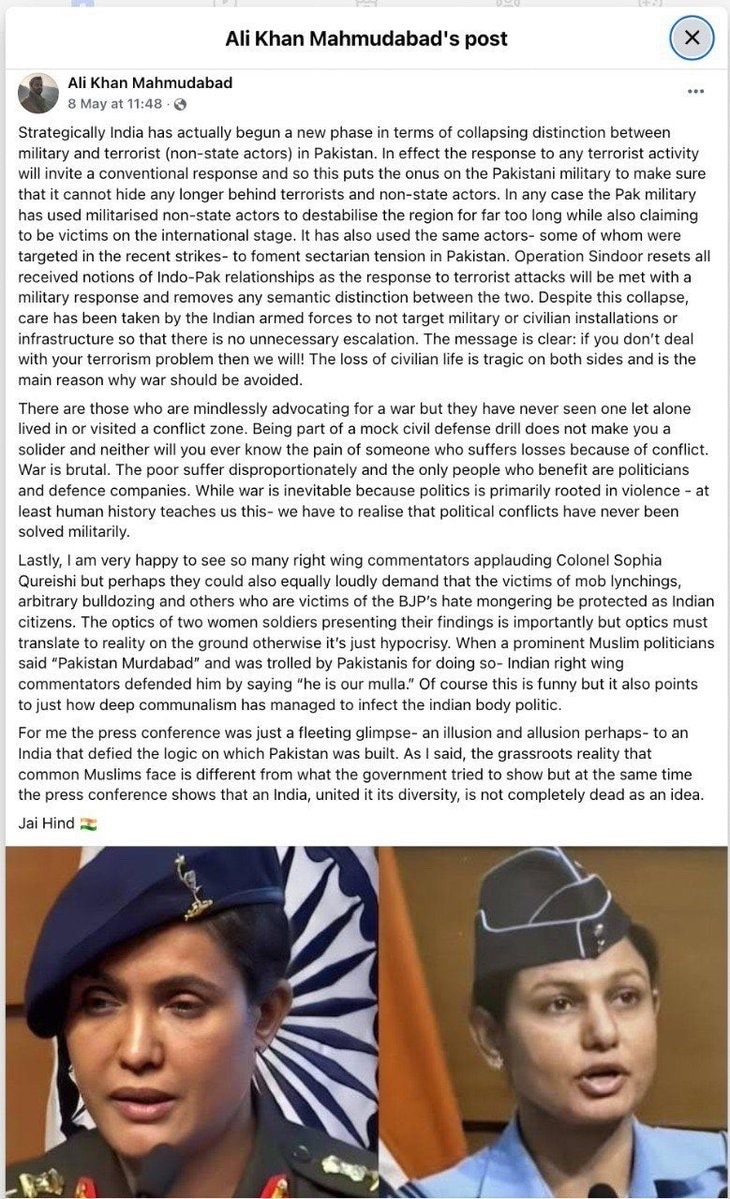The Supreme Court on Wednesday extended the interim bail granted to , Associate Professor and Head of the Political Science department at Haryana's Ashoka University, in connection with a controversial social media post on .
The post had sparked outrage online and prompted legal action under sections related to national security and public order. The court said it would hear the matter in detail later.
SC refused to modify the restrictions it had earlier placed on Ali while granting him interim protection from arrest over his Facebook post on Operation Sindoor, reports Bar and Bench.
Mahmudabad had challenged the court’s earlier condition that barred him from making public posts or comments. However, a bench of Justices Surya Kant and Dipankar Datta clarified that the restriction applies only to comments or posts related to the subject matter of the two FIRs filed against him and not to his general online activity.
“See, he can write and speak, no reservations. But only not with regard to the subject matter of investigation,” the bench remarked, rejecting the plea to relax the restriction. The court said it would reconsider the issue at the next hearing scheduled for July. “Let it be for now. We will see on the next date. List after partial working days in July,” the bench directed.
In a limited relief to Mahmudabad, the court directed that the investigation by the Special Investigation Team (SIT) should not be a sweeping or open-ended inquiry. Instead, it must remain strictly confined to the two FIRs linked to his Facebook post, the Bar and Bench report said.
The direction came after the state indicated that it might need to search Mahmudabad’s premises and expand the scope of the investigation. Justice Surya Kant firmly dismissed this notion, saying, “No, don’t turn this to left, right, centre. Just focus on two FIRs.”
This direction was also recorded in the official court order: “We order that investigation shall be confined to the two FIRs. The investigation report to be produced before this court. Let interim protection be extended.”
On May 21, Wednesday, the top court directed the constitution of a Special Investigation Team (SIT) to probe the complaint filed against Ali Khan Mahmudabad.
The directive came in response to a petition filed by Mahmudabad, who challenged his arrest over the controversial social media post on Operation Sindoor. He was represented by senior advocate Kapil Sibal.
Mahmudabad had been arrested by the Haryana police from Delhi and remanded to two days in police custody. Two separate cases were registered against him in relation to the post, which referred to Operation Sindoor and allegedly made remarks that authorities found objectionable.
The Supreme Court bench, comprising Justices Surya Kant and NK Singh, ordered the Director General of Police, Haryana, to form the SIT within 24 hours including three senior police officers not from either Haryana or Delhi, and must also including at least one woman officer. The court emphasized the need for an unbiased investigation, especially given the political and emotional sensitivities involved.
Alongside the SIT order, the court granted Mahmudabad interim bail, subject to specific conditions. He is required to fully cooperate with the investigation and refrain from making any public statements regarding the case.
The bench clarified that the interim relief could be withdrawn if the investigating team finds additional incriminating evidence. “If the investigation authority finds any further incriminating material, they can place it on record and seek modification of the interim order,” the court noted.
During the hearing, Kapil Sibal defended Mahmudabad, asserting that the professor’s post was patriotic and intended to salute Indian women officers. “The post is not creating any communal tension,” Sibal argued. “His wife is nine months pregnant and due to deliver any time. The post was a patriotic statement, just see what he says on the idea of India. He ends with ‘Jai Hind’.”
However, the state’s counsel contended that some of Mahmudabad’s words carried double meanings that could be perceived as offensive. The court agreed that the language used was problematic and advised the professor to use simple, neutral terms that avoid hurting public sentiments. “The choice of words matters, especially when discussing sensitive national issues,” the bench observed.
Mahmudabad, in his clarification to the court, said that his remarks had been misinterpreted. He explained that his intention was to criticize aggressive, war-mongering rhetoric and to emphasize the importance of protecting all Indian citizens, especially minorities, during conflicts. He also expressed his support for the Indian military’s measured and professional conduct, while strongly condemning terrorism and Pakistan’s actions.
The controversy deepened earlier when Renu Bhatia, chairperson of the Haryana State Commission for Women, criticized Mahmudabad for failing to appear before the commission regarding his remarks. Bhatia described his post as disparaging to women officers in the armed forces, particularly Colonel Sophia Qureshi, who was referenced in his comments.
Mahmudabad had pointed out that while right-wing groups were praising the woman officer’s role, the same groups were silent on incidents like mob lynching and the bulldozing of homes.
The case continues to draw nationwide attention as it touches on key issues like freedom of expression, national security, civil liberties, and the evolving role of academia in public discourse.
You may also like

Michelle Obama says people spilled water on her while trying to reach her famous husband

Ryan Reynolds' F1 team bids to emulate Wrexham success with 2026 race win promise

'I sell loads on Vinted and I don't write descriptions, here's what I do instead'

Phone tapping case: SC directs return of passport of Telangana ex-intelligence chief

UK weather maps turn red as Britain faces 26C 'mini heatwave'







